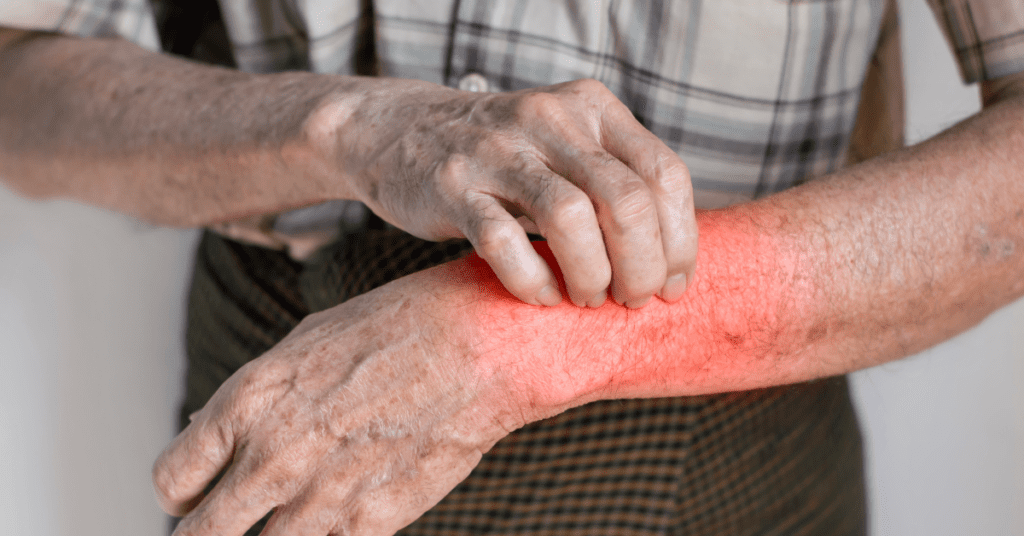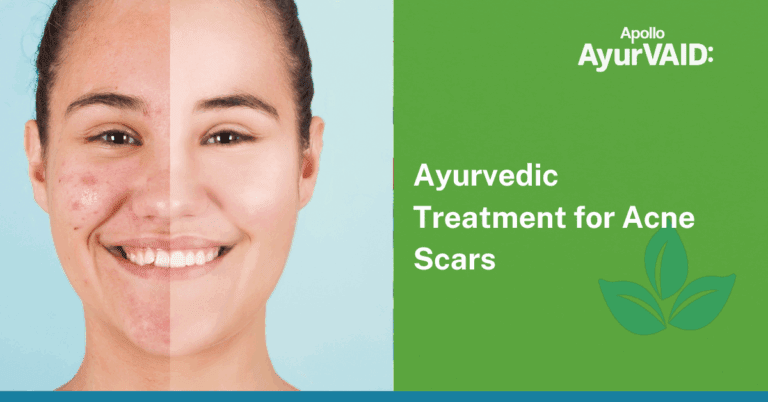Among the myriad ailments that Ayurveda addresses, fungal infections and skin allergies are two common issues that concern many individuals. While modern medicine offers effective treatments, Ayurveda provides a unique perspective rooted in holistic principles. Fungal infections, such as ringworm, athlete’s foot, and candidiasis, are caused by various types of fungi. These infections can affect the skin, nails, and other parts of the body, leading to discomfort and sometimes severe complications if left untreated. Ayurvedic treatment for fungal infection involves balancing the body’s doshas, detoxifying the system, and using natural antifungal herbs to eliminate the root cause. Skin allergies, on the other hand, manifest as itching, redness, swelling, and sometimes blistering due to hypersensitivity reactions triggered by allergens like pollen, certain foods, or environmental factors.

Ayurvedic Understanding of Skin
Ayurveda perceives the skin as a reflection of an individual’s internal health and vitality. According to Ayurvedic philosophy, the skin is governed by the Pitta dosha, representing metabolic functions and transformational processes. Any imbalance in the doshas, particularly Pitta, can manifest as various skin disorders, including fungal infections and allergic reactions. Another unique concept of Ayurveda is the understanding of Prakriti, an individual’s unique constitution determined by the predominance of doshas at birth. Understanding one’s Prakriti aids in the personalized management of skin diseases. For instance, individuals with a Pitta-dominant constitution may be more prone to inflammatory skin conditions like eczema and psoriasis, while those with Vata dominance may experience dryness and susceptibility to fungal infections. Ayurvedic treatment for skin allergy focuses on restoring dosha balance, detoxification, and using natural herbs to soothe inflammation and boost skin health.
Pathogenesis of Skin Diseases
- Skin diseases in modern medicine are caused by a range of factors, including genetic predispositions, environmental triggers like allergens and pollutants, microbial infections such as bacteria, fungi, and viruses, immune system dysfunction leading to conditions like psoriasis and eczema, inflammation pathways, hormonal influences, and lifestyle factors like diet, stress, and skincare practices. These factors interact to disrupt the normal functioning of the skin, leading to various dermatological conditions.
In Ayurveda, skin diseases are attributed to the accumulation of ama, or toxins, in the body, which disrupts the normal functioning of tissues and channels. Factors such as improper diet, sedentary lifestyle, and mental stress contribute to the accumulation of ama and aggravation of doshas, predisposing individuals to skin ailments. Fungal infections and skin allergies are viewed as manifestations of aggravated Pitta and Vata doshas, respectively.
Causes and Symptoms of Fungal Infections
Ayurvedic Causes of Fungal Infections
Ayurveda holds that a dosha imbalance could cause fungal infections. Mostly, an imbalance of Pitta (which causes heat and inflammation) and Kapha (which encourages dampness) makes the environment ideal for fungus development.
- Poor Hygiene: Improper digestion results in the creation of ama, or toxins, which compromise immunity and upset skin condition.
- Bad Hygiene: Dirt and sweat accumulation aggravates Kapha and increases fungal growth particularly in moist body folds.
- Weak Immune System (Ojas Deficiency): The body becomes more susceptible to outside infections including fungus when ojas, its natural immunity, is deficient.
- Excessive Consumption of Certain Foods: Overeating sweet, fermented, or greasy foods could worsen Kapha and encourage fungal overgrowth.
- Wearing Tight Clothes: Wearing tight or damp clothes reduces appropriate air circulation, which traps moisture and promotes fungal growth.
Symptoms of Fungal Infections
- In Ayurveda, fungal infections are known as Dadru and manifest as red, itchy, circular rashes (Kandu and Raga).
- Scaly or flaking skin
- Daha—burning or stinging sensations
- Coloration of nails or skin
- In chronic situations, ozzing or pus development
Ayurvedic Treatment for Fungal Infection
Usually resulting in continuous itching and discomfort, fungal infections can be somewhat disruptive. Ayurveda, however, provides several age-old, trusted natural and potent treatments. Let’s examine some of them:
- Turmeric: An Organic Antifungal Hero: Strong antifungal and therapeutic effects abound in turmeric, sometimes referred to as the “golden spice.” Curcumin, its primary chemical, lowers swelling and battles infections. Either eat turmeric or apply a paste created with turmeric and water on the affected skin. It calms inflammation, lessens the itching, and aids in the death of the fungus.
- Neem: A Strong Herbal Warrior: Renowned Ayurvedic plant neem is well-known for battling fungus and bacteria. Clearing fungal infections can be achieved by utilizing soaps derived from neem or neem oil application. It not only gets rid of the infection but also lessens redness and itching and calms the skin.
- Aloe Vera – Healing and Cooling: Healing properties and cooling impact of aloe vera gel are well-known. It also opposes fungal diseases. Fresh aloe vera gel helps speed up healing, ease inflammation, and minimize itching on afflicted skin.
- Garlic: An Excellent Natural Remedy: Natural treatment for infections has long been offered by garlic. It includes a chemical called allicin, which battles many types of fungus and bacteria. Raw garlic or applying garlic oil to the afflicted region will help eliminate the fungus as well as lower inflammation and itching.

How Does Ayurveda Treat Fungal Infections And Allergies?
Ayurveda treatment approach targets the root cause of any disease, especially skin diseases, the underlying pathology and causes are important to note. Primarily Ayurveda treatment consists of herbal medications, diet and lifestyle modifications, and Panchakarma therapies.
- Herbal Formulations: Ayurvedic pharmacopeia offers a plethora of herbs with potent anti-fungal, anti-inflammatory, and immunomodulatory properties. Herbs such as Neem (Azadirachta indica), Turmeric (Curcuma longa), and Manjistha (Rubia cordifolia) are commonly prescribed for fungal infections, while herbs like Aloe Vera (Aloe barbadensis) and Triphala (a combination of three fruits) are beneficial for skin allergies. Important to note that herbs and herbal formulations provide the best results only when prescribed by Ayurveda doctors suitable to individual health concerns.
- Dietary Modifications: Ayurvedic dietary guidelines advocate for a balanced diet tailored to individual constitutions. Pitta-pacifying foods, such as cooling fruits and vegetables, are recommended for individuals prone to skin allergies, while Pitta-aggravating foods like spicy and fermented items should be avoided. Incorporating digestive spices like cumin and coriander aids in reducing ama and promoting skin health.
- Lifestyle Recommendations: Ayurveda emphasizes the importance of lifestyle modifications to maintain optimal health. Regular exercise, adequate sleep, and stress management techniques like meditation and yoga help balance the doshas and enhance immunity, thereby reducing susceptibility to skin diseases.
- Detoxification Therapies: Panchakarma is the key to Ayurvedic detoxification, and offers comprehensive cleansing procedures to eliminate accumulated toxins and rejuvenate the body. Virechana (therapeutic purgation) and Raktamokshana (bloodletting) are particularly beneficial in managing skin disorders by expelling excess Pitta and purifying the blood.
- Skincare Regimen: Ayurvedic skincare involves using natural ingredients suited to individual skin types. Cleansing with herbal formulations, moisturizing with nourishing oils like sesame or almond, and occasional exfoliation with herbal scrubs promote skin health and prevent the recurrence of skin ailments.
Ayurveda’s holistic approach to managing fungal infections and skin allergies encompasses a comprehensive understanding of skin physiology and personalized interventions. Integrating Ayurvedic principles into clinical practice offers a nuanced perspective and expands therapeutic options for dermatological conditions, enhancing overall well-being for patients.






